#Charles Culverton-Smith
Text
A line I read in one of the Sherlock short stories ("My friend never stood on the dock") and my recent fixation on the Ace Attorney series led to me asking one question.
"What if Sherlock Holmes did go on trial, being accused of murder?"
The short story title would refer to the courthouse (maybe The Old Bailey, referenced in The Great Ace Attorney Chronicles.)
Immediately following his arrest, Holmes sends a message to Watson. In the note, he tells Watson not to get sentimental and visit him in jail that night, but instead to investigate the scene of the crime, and see what he can deduce from it. Showing great trust in his friend, Watson does just that and takes very detailed notes on his findings.
"There was never a greater test of my own powers of observation."
And because of Holmes's status as a sort of celebrity, he will have a closed trial, with only members of the judiciary and key people on the case attending. This is to prevent the trial from becoming a media circus, and ensure the verdict will be reached by evidence and testimony rather than public opinion.
Godfrey Norton, who is now Irene Adler's husband, is serving as Holmes's defense counsel. Irene herself is attending the trial, watching from the gallery. (This is the final way Irene outsmarted Holmes in A Scandal in Bohemia - everyone believed Norton was a prosecutor working on her behalf, when he was actually a public defender.)
The opposing counsel is Charles Culverton-Smith, a prosecutor who is on track to become Director of Public Prosecutions. There’s a possibility that he took the case to add to his reputation (but that’s just speculation on Watson and Norton’s part.)
Watson tells Holmes of this theory when they speak in the defendant's lobby just before the trial, but Holmes is skeptical.
"If Culverton-Smith truly wanted to bolster his reputation, he would insist on a public trial where he could show his legal prowess to a larger audience. There is something else at play here, something far more sinister."
The trial begins. Both Norton and Culverton-Smith give their legal arguments, supporting their stances with evidence and witness testimony.
Watson is the final witness to speak in the trial. He describes his findings at the crime scene, and tries to use factual language (as Holmes remarked to him before, when talking about his writings.) Everyone in the courtroom (including the judge and the prosecution) believe Watson's observations to be so important, that they agree to call for a thirty minute recess. During the pause in proceedings, Lestrade and other policemen to look over the crime scene one more time alongside Watson to confirm what he said was true.
Sure enough, Watson's deductions prove that Sherlock Holmes couldn't have been the killer. When court is back in session, Lestrade gives his report. Based on the new information, the judge hands down a verdict of "not guilty" to Sherlock Holmes.
There is little time to celebrate, as Holmes immediately whisks Watson away to the streets of London. He insists they make haste the nearest carriage, because "There's still time to catch the true mastermind behind this devious plot!"
Lestrade picks up on Holmes's pursuit and decides to lead his own forces to block one of the main exits to London.
Meanwhile, Holmes and Watson enter a high speed chase against the true culprit, who's been behind at least two other incidents of framing people for murders he committed.
At the end of the chase, the criminal is surrounded by Lestrade and his police force on one side, along with Holmes and Watson (who is armed with his revolver) on the other side. He finally surrenders and gives himself up, at last being taken into custody.
Watson is astonished at this turn of events. "My dear Holmes, you've done it again! I'm speechless!"
"Indeed I have, but I insist you don't undersell your role in this, dear Watson. This case would have a much darker conclusion without your thoughtful analysis. I trust that you will reflect that in your writings, if there is ever a time you will be permitted to release the details to the public."
Charles Culverton-Smith catches up with Holmes and Watson. He didn't get a chance to speak with them after the trial, but wanted them to know that he harbored no ill will towards Holmes. He was simply doing his job as a man who practices law, and couldn't imagine leaving the trial to anyone else. Because everyone deserves a fair trial, and many other lawyers are biased either for or against Holmes, depending on how his actions affected their cases.
Holmes comments that Culverton-Smith will make a fine Director of Public Prosecutions when the time comes, since his integrity speaks for itself.
"If I am ever on the dock in the future, I would trust your judgment."
Watson insists Holmes not talk about "the next time in court" because he doesn't want there to be a "next time."
Holmes agrees to move on from the subject. He points out there is still ample time for breakfast and sets off to find the nearest place that will serve Watson's favorite dishes. "My treat, naturally."
Watson concludes the story mentioning that five years have passed since the first and only trial of his friend, Sherlock Holmes. The events in the closed courtroom have been made public, to teach students of law how to conduct a fair trial of a famous (or infamous) client.
#Sherlock Holmes#ACD Holmes#John Watson#Inspector Lestrade#Sherlock Holmes OC#Charles Culverton-Smith#Sherlock Holmes fan case#Watson does deductions#Sherlock goes on trial#courtroom drama#Letters from Watson
31 notes
·
View notes
Text
The most evil man
Today I read the first part of "The Adventure of Charles August Milverton" (thanks to Dr. Watson as always) and in a few lines you can already know the type of adversary he is.
There are many types of antagonists in all Holmes' stories, but those who are smart have a special place in the canon. Let's see some examples:
Irene Adler in "A Scandal in Bohemia" is the rival of Sherlock Holmes in that case. She left so strong impression in the detective that he calls her The Woman. She's smart, charming, beautiful and bit playful character, but above all she is not a villain. All that she does is to run away with her lover husband and start a new life. A smart woman with strong character that outsmarted Holmes.
In "The Adventure of the Dying Detective" we have Culverton Smith as opponent. He use a tropical disease to kill his nephew for money (IIRC) and tries to do the same with Holmes. He's evil because he kills his own family for what he wants and he has the willingness to do it again with whoever dares to search the truth.
Professor James Moriarty from "The Final Problem" is so far the most famous rival of Holmes, mathematics professor and criminal mastermind. Moriarty is essential in every adaptation of the canon and his intelligence is one of his higlights as a character. What makes Moriarty evil? The professor is the one who plans crimes for other people to execute in exchange of money. He doesn't seem the type of person who commits the crime for himself, he perfectly could be in his office, eating fish and chips while his minions do the dirty work. The evil in Moriarty is that he uses his brilliant mind for planning crimes and apparently he loves that.
We just have the first part of this story, but Charles August Milverton seems to be a completely different type of antagonist. He is smart but instead of making many different plans like Moriarty he uses blackmail. Just like Smith he wants money and is ready to take action himself and see the victim. He looks like a harmless person just like Adler but, contrary to all of these examples, Milverton enjoys to see his victims suffering. There's pleasure in watching the blackmailed person begging for a new deal, extra time or whatever they need to keep everything behind the rug. Charles August is the type of villain who wants to see the world on fire.

Speaking in chilean, él es un conchesumadre.
#letters from watson#sherlock holmes#charles augustus milverton#CHAS#acd canon#a scandal in bohemia#SCAN#the dying detective#DYIN#the final problem#FINA#irene adler#culverton smith#professor james moriarty#letters in the underground
43 notes
·
View notes
Text

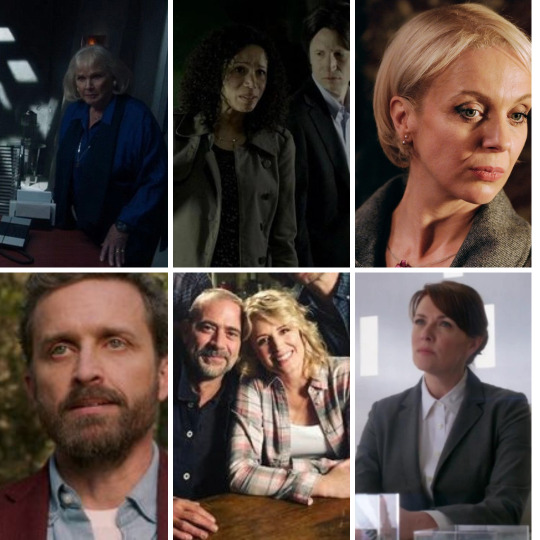
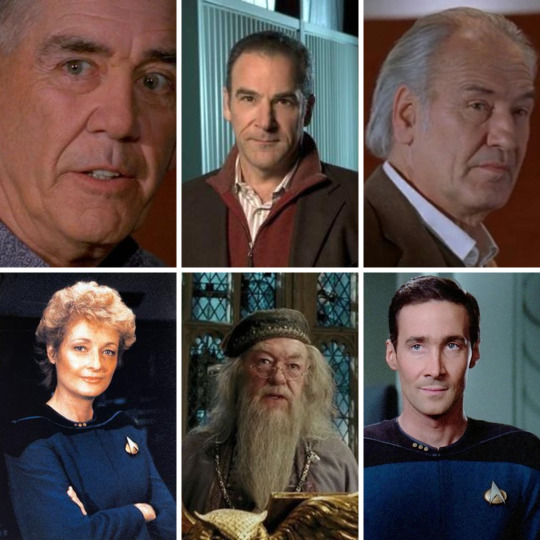

Once again adding to lists of my posts technically from tiktok but I’m cross posting here.
Can you tell I have a lot of fictional character anger? /s
#confront characters#mummy holmes#sally donovan#philip anderson#mary morstan#mary watson#charles augustus mangussen#culverton smith#john winchester#mary winchester#naomi spn#chuck spn#house md#john house#rowan chase#jason gideon#star trek tng#bruce maddox#katherine pulaski#albus dumbledore#dead poets society#mr perry#fire lord ozai#sailor moon#prince demand#jupiter ascending#balem abrasax#apparently there’s a tag limit#who knew
6 notes
·
View notes
Text
names my girlfriend has given sherlock villains:
- mccarty
- augussen
- trump and his daughter
12 notes
·
View notes
Text
The most evil Sherlock Holmes villain: champions edition
Hello beloved thots. The results of the semi-finals are in, so now you can vote for your favourite overall villain
#sherlock holmes#john watson#johnlock#sherlock#watson#superwholock#acd holmes#acd sherlock holmes#acd johnlock#sir arthur conan doyle#poll#tumblr poll#the hound of the baskervilles#the adventure of the speckled band#the adventure of the greek interpreter#the adventure of charles augustus milverton#the adventure of the dying detective#the adventure of the illustrious client
23 notes
·
View notes
Note
NUMBER 20 FAVORITE VILLAIN! I love seeing peoples’ answers for this. (Mine is Culverton Smith.)
OOOH Culverton Smith is a good one, he's just so slimy. The bit where he's being so cruel to a (seemingly...) dying and delirious Holmes always really gets to me, and I love the part where he talks about how microbes are like his prisoners. He's a definite top contender.
If I had to choose someone else I'd go for Charles Augustus Milverton, for the sole reason that I love that he canonically looks like an evil Mr Pickwick. I'm kind of a Mr Pickwick fan so I love the idea that Sherlock Holmes' biggest (non-Moriarty) nemesis is an evil doppleganger of this loveable philanthropic Dickens character.

7 notes
·
View notes
Text
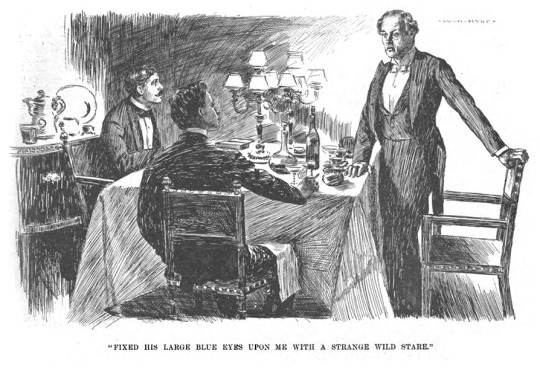
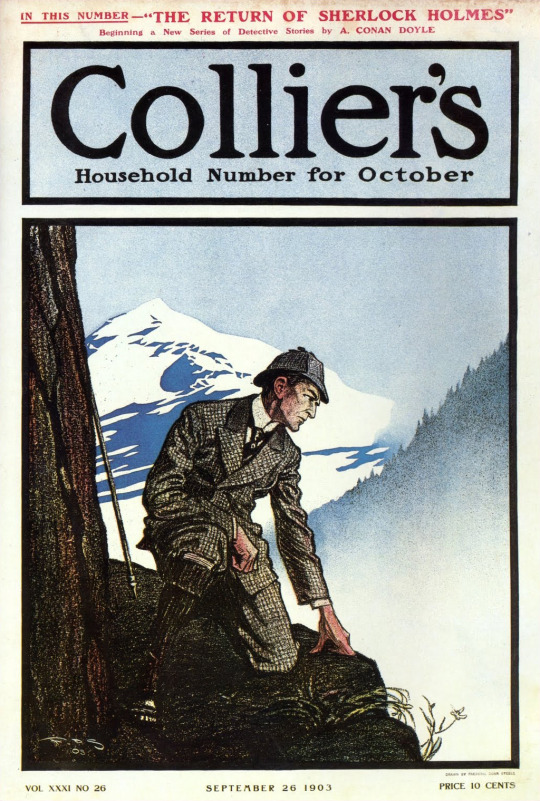



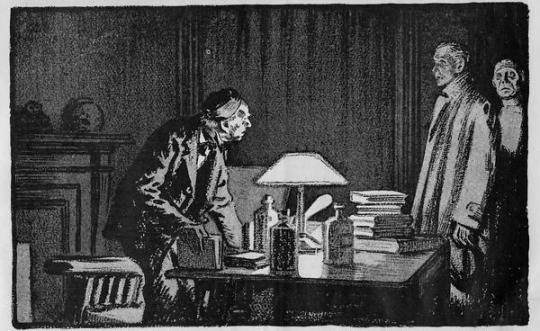
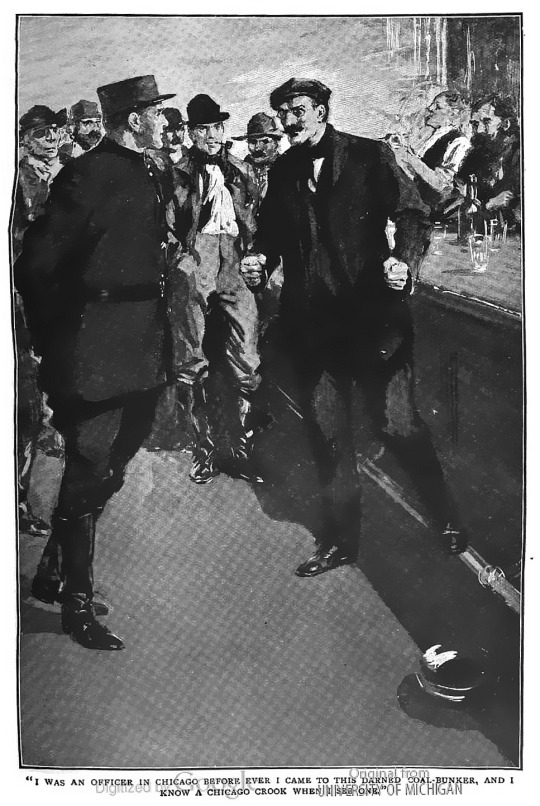




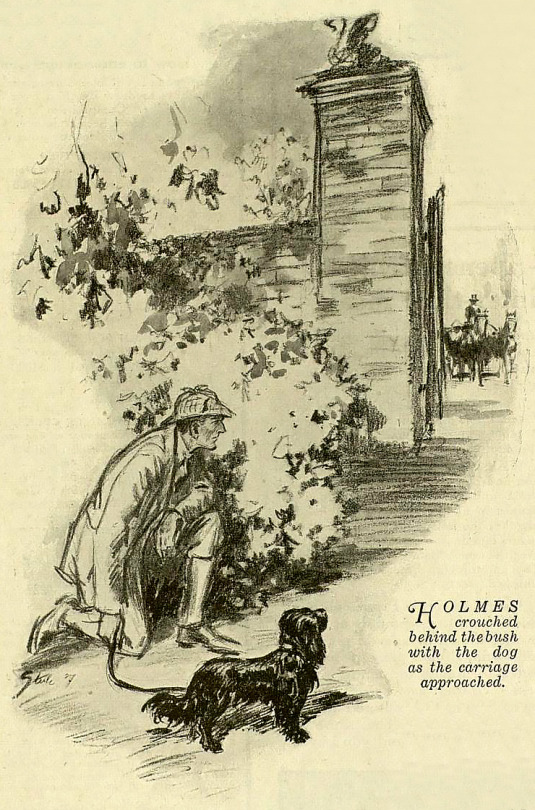
Vote for your favourite, the top 9 will proceed in the bracket. Since theyre all different shapes and sizes, make sure to click into the full views!
Paget Eliminations
Other Artist Eliminations
Full captions and details for each illustration below the cut:
"Fixed his large blue eyes upon me with a strange wild stare." W.H. Hyde, Gloria Scott (Harper’s Weekly)
Characters: Victor Trevor, Holmes, James Trevor
Collier’s cover FD Steele, Empty House (Collier’s)
Characters: Holmes
"There was something of Mr. Pickwick's benevolence in his looks." FD Steele, Charles Augustus Milverton (Collier’s)
Characters: Charles Milverton
"Madam, I have been commissioned to recover this immensely important paper." FD Steele, Second Stain (Collier’s)
Characters: Watson, Holmes, Lady Trelawney
"Holmes swept his light along the window-sill." FD Steele, Bruce-Partington Plans (Collier’s)
Characters: Holmes, Watson
[Watson at Culverton Smith’s practice] FD Steele, Dying Detective (Collier’s)
Characters: Culverton Smith, Watson, Butler
"I was an officer in Chicago before ever I came to this darned coal-bunker, and I know a Chicago crook when I see one." Frank Wiles, Valley of Fear (The Strand)
Characters: Police, Scowrers, Douglas/McMurdo
"Don't break it!" a voice commanded, and the would-be assassin turned from the clever effigy to confront Sherlock Holmes himself!" FD Steele, Mazarin Stone (Hearst’s International)
Characters: Holmes' Mannequin, Count Sylvius, Holmes
"The hall door slowly opened and against the lamp-lit background Holmes and Watson saw the tall figure of Professor Presbury. As he stood outlined in the doorway he was erect but leaned forward with dangling arms." FD Steele, Creeping Man (Hearst’s International)
Characters: Watson, Holmes, Prof Presbury
"Murderous attack upon Sherlock Holmes" HK Elcock, Illustrious Client (The Strand)
Characters: Newsagent
"For a long time I stood in deep meditation while the shadows grew darker around me." FD Steele, Lion's Mane (Liberty)
Characters: Holmes
"Holmes crouched behind the bush with the dog as the carriage approached." FD Steele, Shoscombe Old Place (Liberty)
Characters: Holmes
#acd holmes#sherlock holmes#tumblr bracket#sherlock holmes illustrations#elim poll#oa elim#i did think abt pausing the queue for the holiday uhh lmk if yall want that ig?? i'll leave todays anyway but
16 notes
·
View notes
Text
A Fairy Tale Not For The Faint of Heart
read it on AO3 at https://archiveofourown.org/works/53084188
by Birdie0318
Crown Prince Mycroft of Doylia and Prince Greg of New Scotsyard were arranged to marry at a young age. After his mother’s death, he and Greg are finally married, but not exactly in love. But, Sherlock running away from his duties to go with his lover might spark some feelings between the two.
Words: 474, Chapters: 1/11, Language: English
Fandoms: Sherlock (TV)
Rating: Explicit
Warnings: No Archive Warnings Apply
Categories: M/M
Characters: Mycroft Holmes, Greg Lestrade, John Watson, Sherlock Holmes, Mrs. Hudson (Sherlock Holmes), Anthea (Sherlock), Culverton Smith, Irene Adler (Sherlock Holmes), Charles Augustus Magnussen
Relationships: Mycroft Holmes/Greg Lestrade, Sherlock Holmes/John Watson
Additional Tags: Alternate Universe - Fantasy, Arranged Marriage, Alternate Universe - Royalty, Alternate Universe - Medieval, Dragons, Witches, Sirens, Gorgons (Ancient Greek Religion & Lore), Fairies, Smut, Mutual Pining, They Are Idiots, Falling In Love, Angst
read it on AO3 at https://archiveofourown.org/works/53084188
2 notes
·
View notes
Text
THE GAME III - « Sic Itur Ad Astra. »
read it on the AO3 at https://ift.tt/pEHy3YQ
by AMAZINGmadness
Les Jeux. Petits, grands, sans conséquences, mortels. Les Districts, le Capitole. L'Académie, l'Université, les Hunger Games. James aimait les jeux. Il avait appris à jouer, très tôt, appris à survivre. Les Jeux, de toutes sortes, lui avait permis de s'élever, de briller, de rayonner. Les Jeux, oui, avaient détruits tout ce qui restait de bon, d'humain, en lui.
Jusqu'aux 75e Hunger Games. Jusqu'à Sherlock. Jusqu'aux complots, aux plans, à cet espoir qui était revenu germer en lui, s'était implanté, inflexible. Aujourd'hui figure emblématique de la rébellion portée par le District Trois, il se doit de continuer à se battre pour cet espoir, continuer à jouer pour les autres.
Et, peut-être, pour sauver ce qui lui reste d'âme.
(Hunger Games AU. Crossover Sherlock x Killing Eve)
Suite et fin - de THE GAME I - « Memento Mori » & THE GAME II - « Forget Me Not ».
Words: 10090, Chapters: 1/12, Language: Français
Series: Part 3 of Before We Drift Away
Fandoms: Sherlock (TV), Killing Eve (TV 2018), Hunger Games Series - All Media Types
Rating: Explicit
Warnings: Graphic Depictions Of Violence, Major Character Death
Categories: F/F, F/M, M/M
Characters: Sherlock Holmes, Jim Moriarty, Villanelle | Oksana Astankova, Culverton Smith, Charles Augustus Magnussen, Sebastian Moran, Eve Polastri, Irene Adler (Sherlock Holmes), Victor Trevor
Relationships: Sherlock Holmes/Jim Moriarty, Eve Polastri/Villanelle | Oksana Astankova, Sherlock Holmes/Victor Trevor, Past Carl Powers/Jim Moriarty
Additional Tags: Alternate Universe - Hunger Games Setting, Inspired by The Hunger Games, War, Rebellion, Survival, POV Jim Moriarty, Post-Traumatic Stress Disorder - PTSD, Angst, Character Death, Blood and Violence, Implied/Referenced Torture, Implied/Referenced Drug Use, Emotional/Psychological Abuse, James is not a monster, James has a plan, Eurus has a plan, James and Eurus are plotting, Mycroft had a plan, Oksana is a psychotic sweetheart, Established Eve Polastri/Villanelle | Oksana Astankova, Sherlock is a Mess, James Has Issues, Protective Jim Moriarty, Protective Eurus Holmes, Sherrinford is the 4th Holmes sibling, Enemies to Allies To Lovers, again ?, Smith is the real monster here, Redemption
read it on the AO3 at https://ift.tt/pEHy3YQ
1 note
·
View note
Text
Sherlock abt Moriarty: genius. Respectable. A good player of the game. Resourceful. Can admire his intellect and abilities.
Sherlock @ culbertson and magnussen: YOU RICH FUCKS BULLY PEOPLE AND GASLIGHT THEM. EAT THE RICH AND GET FUCKED!
#i mean basically#john watson is bi#john watson#sherlock season 4#sherlock is gay#bbc sherlock#sherlock#sherlock holmes is gay#sherlock holmes#culverton smith#charles agustus magnussen
10 notes
·
View notes
Text
Moriarty: HOW CLOSE AM I TO DESTROY SHERLOCK! MY ARCH NEMESIS!!! HAHAHAHAHA
Magnussen: Wait... I thought I was his arch nemesis
Culverton Smith: It’s more past memories but same here
Mycroft: Aren’t I his arch nemesis or...
Moriarty: You know what, we’re all just gonna go and ask him
#incorrect quotes#incorrect sherlock quotes#bbc sherlock#james moriarty#ch : james moriarty#ch : charles augustus magnussen#charles augustus magnussen#culverton smith#ch : culverton smith#Mycroft holmes#ch : mycroft holmes#admin : ther#source : unknown#1431
486 notes
·
View notes
Photo



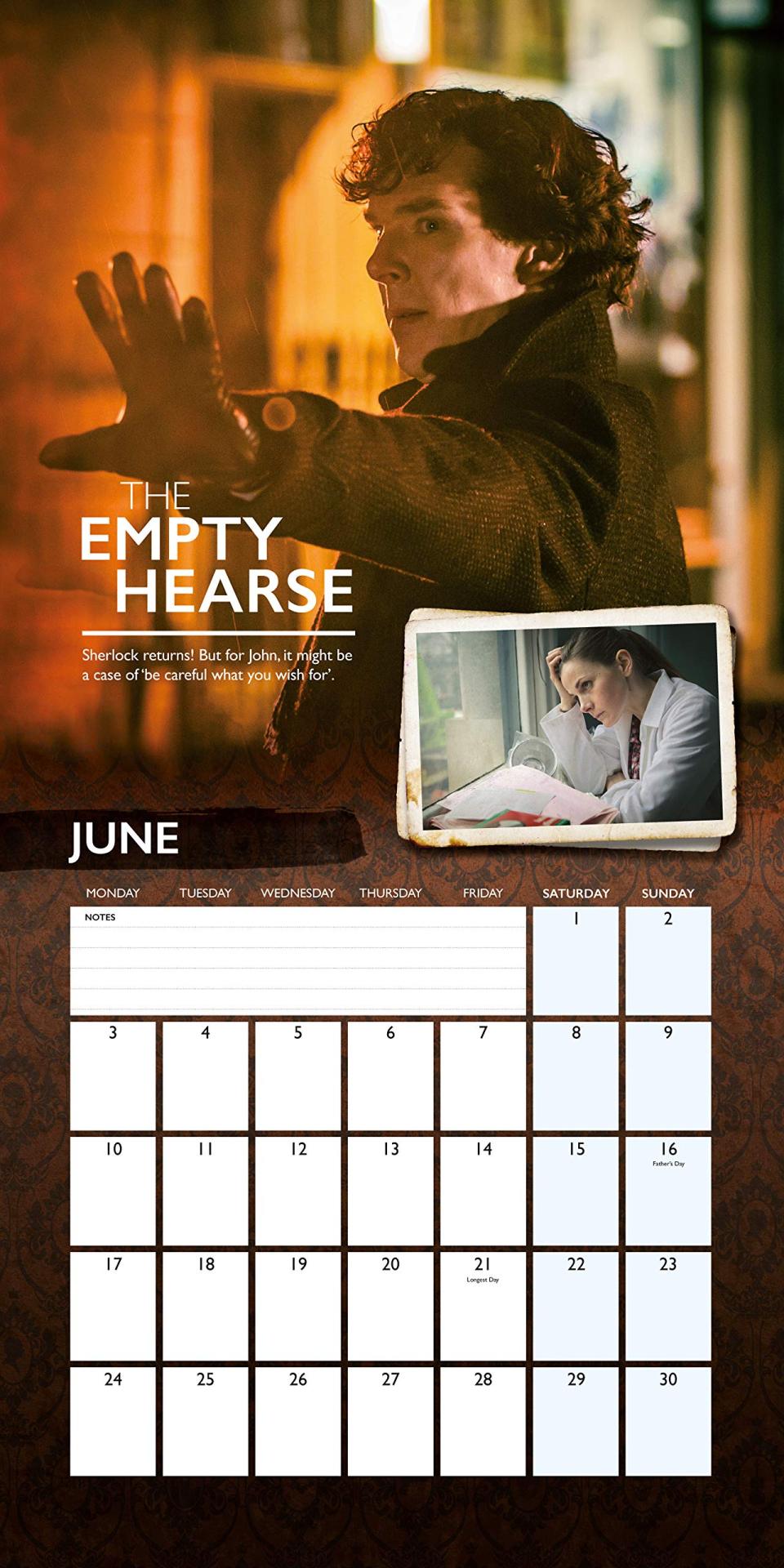
Sherlock Official 2019 Calendar
Heyyyyy, look who finally has too many episodes to fit on a monthly calendar.
This calendar features imagery from all 12 episodes across the three Sherlock series as well as from The Abominable Bride Christmas Special... (x)
So ASiP is probably on a bonus page?
#sherlock#bbc sherlock#merch#sherlock holmes#john watson#sarah sawyer#lestrade#irene adler#henry knight#jim moriarty#moriarty#molly hooper#mary morstan#bridesmaid#charles augustus magnussen#mrs. hudson#rosamund mary watson#culverton smith#mr. holmes#eurus#mrs. holmes#mycroft holmes#can't tag all the episodes because it hits a tumblr wall#so#series 1#series 2#series 3#the abominable bride#series 4#you have too many things calendar
79 notes
·
View notes
Photo
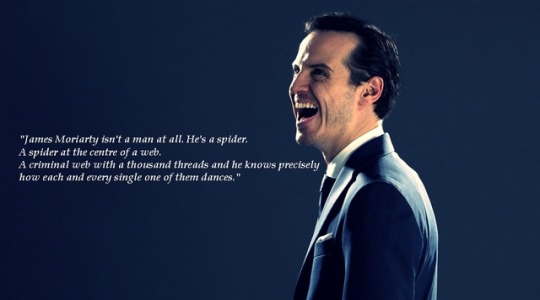
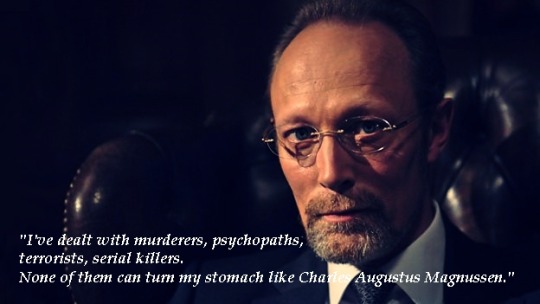

Sherlock Holmes describing his biggest enemies.
#bbc sherlock#sherlock hobbs#jim moriart#charles augustus magnussen#culverton smith#consulting criminal#cereal killer#napoleon of blackmail#the reichenbach fall#his last vow#the lying detective#villains#andrew scott#lars mikkelsen#toby jones
42 notes
·
View notes
Text
Villains & Stairs in BBC Sherlock: A Meta (Part 1)
We are introduced to every single major antagonist* in BBC Sherlock with references or visuals to moving up or down stairs. Once I noticed the pattern I couldn't stop finding more examples of it, and this meta was born. I honestly thought I was done finding new things in this show but Moftiss love to prove me wrong....
This meta proposes that the physical location of the ground floor represents the heart, whereas the upper levels represent the mind. Following this logic, we can deduce (hah) that the villains introduced walking UP stairs are coming from/motivated by their heart, and villains introduced walking DOWN stairs are coming from/motivated by their mind.
Breakdown of each antagonist under the cut:
List of Major Antagonists* and the episode in which they first appear as themself:
Jeff Hope (ASiP)
Moriarty (TGG)
Irene Adler (ASiB)
Charles Augustus Magnussen (HLV)
Culverton Smith (TLD)
Eurus Holmes (TFP)
…. and Mary (TEH) >:)
*defined by a lot of screentime in their episode(s), and a lasting memory within a casual audience
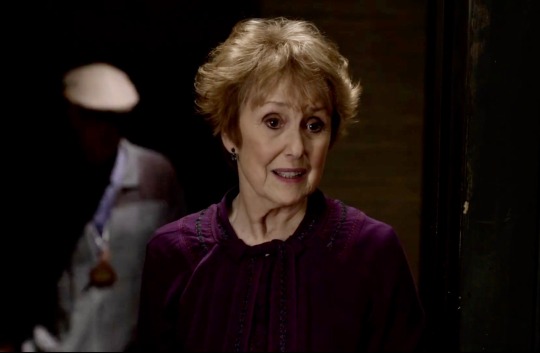
ASiP: Jeff Hope, the cabbie, who is first seen climbing the stairs into the 221b flat, is killing to earn money for his children. His is a crime motivated by the heart, though he moves upstairs to the mind to execute his "proper genius" suicide pill game.
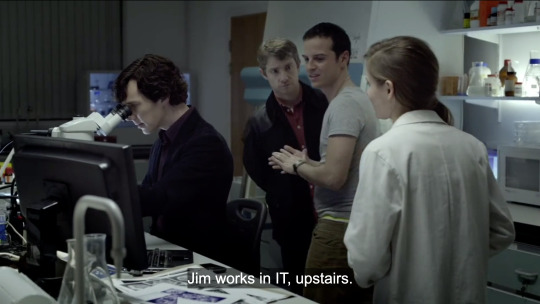
TGG: Molly unknowingly introduces us to Moriarty when she says, “Jim works in IT, upstairs. That’s how we met. Office romance.” Moriarty comes downstairs from mind (he literally works in IT) to heart, tricking Molly into dating him so he can get to Sherlock.
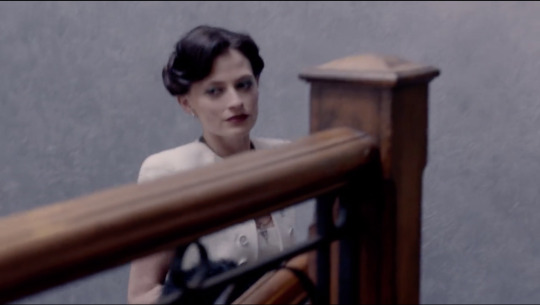
ASiB: We meet Irene as she walks up the stairs looking at the photographs of Sherlock on her phone. She is coming from her heart to play mind games, but in the end she shows her true colors with her phone passcode, “SHER-locked”.

TEH: Ahhh Mary. In true villain form, the very first time we see her, she is descending a grand staircase. She is moving from the upper level of mind to the ground level of heart to deceive and manipulate John, who is planning to propose in the ultimate expression of heart.
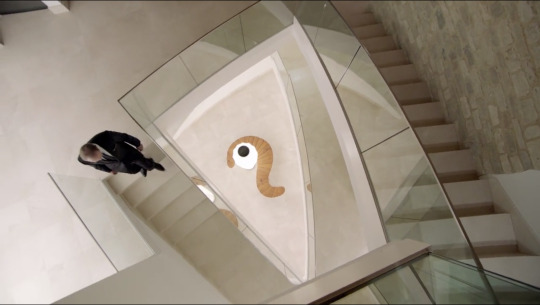

HLV: We get multiple shots of Magnussen walking down stairs in his introductory scene. He is motivated by information and control, moving from mind, and as we know, descending to heart, aka his “vaults”. His vaults are full of secrets and blackmail material, of which he says, “This is where I keep you all.”


TLD: Our first shot of Culverton cuts to news footage of him walking down a staircase to greet reporters, waving and smiling for cameras. He is going from mind to heart to deceive the public waiting on the ground floor, putting on an act as the perfect caring philanthropist.
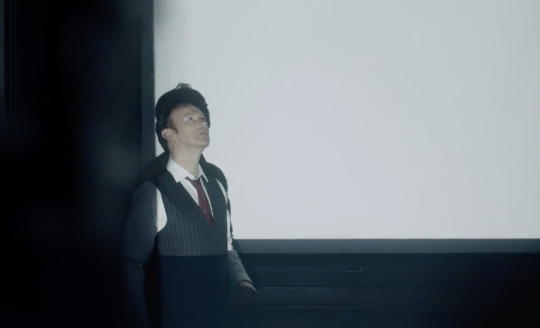
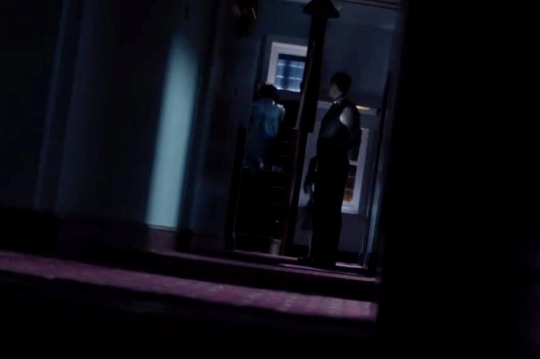
TFP: Honestly, Eurus was the toughest major villain to fit into this pattern. But in the beginning of TFP, Mycroft hears a voice calling his name and footsteps running across the floor upstairs. He looks up, and the fake homeless network Eurus runs upstairs and Mycroft chases after her. This parallels Sherlock running up the stairs at the end of the episode to find her in her room upstairs, trapped in her mind.
109 notes
·
View notes
Note
is the Sherlock au still a thing? because i’m wondering how Tennyson would fit in. he gives me Culverton Smith vibes but he also draws people in, takes their money and leaves them high and dry which feels pretty Irene Adler. idk.
Dear anon, the Sherlock AU is always a thing.
Tennyson has big Culverton Smith vibes, like, seems good guy, is bad guy (it be that plain sometimes).
If a Ranger would go rogue, that would be Charles Magnussen. 11/10. Just,,,,,, it is what it is </3
I'm really itching to find an Irene Adler noooowww that'd be amazing.
ALSO would Pauline be Mary?? like the whole love triangle works and don't tell me Pauline wouldn't be that badass. you can't.
9 notes
·
View notes
Text
My thoughts on the 1989-2010 BBC Radio Drama adaptation of Sherlock Holmes with Clive Merrison
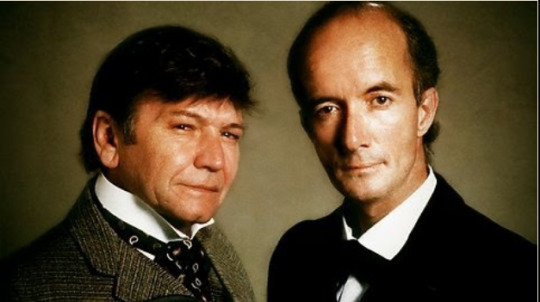
Michael Williams and Clive Merrison
The Sherlock Holmes BBC radio drama series starring Clive Merrison is known to be the first adaptation to adapt every canonical story. It is also in my opinion, the best adaptation.
But let’s start with the basic facts of this radio series. There were technically two series of Holmes adaptations, both starring Clive Merrison as Holmes.
The first was the complete adaptation of all 60 of the canonical stories. They were broadcast from 1989 to 1998. They starred Michael Williams as Doctor Watson. They were made in two formats. The short story adaptations were about 45 minutes long, and were broadcast from 1990 to 1995 in the order the original stories are in the book collections (probably the first adaptation to be that systematic about it, earlier adaptations did them out of order). Each adaptation of the four longer stories are in two parts, each one hour long. The first two novels were first broadcast in 1989, the latter two in 1997 and 1998.
The 45 minute format for the short stories matter because while Holmes has often been adapted to radio before this BBC series, it had seldom or perhaps even never had a regular series of this length. Most adaptations for radio of the stories until that point were just 30 minutes long. That was what Rathbone and Bruce had to work with in their radio series (even less actually due to the commercials), and also that was the episode length of the Gielgud/Richardson series and the Carleton Hobbs/Norman Shelley series. The 45 minute format meant that the stories had time to breathe but also meant that especially the shorter and simpler stories had to be expanded upon.
The adaptations are still largely faithful, the basic plot and characters of the original are still there in the radio dramas, but they all have extra scenes to work out in the 45 minute format.
This extra material is technically filler, but doesn’t feel like it. Instead of just taking up airtime, the writers actually try to add something to the canonical story being told. The radio plays dramatize what is only talked about in passing in the original, try to add emotional depth and motivations to characters, or even outright try to fix faults in the original story.
To name some examples, we get to hear the dramatic backstory actually be dramatized in “The Crooked Man”, Violet Smith gets to confront Carruthers about how he played cards for her in “The Solitary Cyclist”, a socially awkward Holmes tries to invite Watson to spend Christmas with him in “The Blue Carbuncle” and we learn who the mysterious Mrs Turner is in “A Scandal in Bohemia” (one of Conan Doyle’s many continuity errors, where he forgot Mrs Hudson’s name and called her Turner. This gets elegantly solved solved by making Ms Turner someone Mrs Hudson hired to fill in for her when Mrs Hudson was ill.)
The results are overall brilliant, thanks to the quality of writing. The adaptations of canonical material is generally well-done, with the expansion of the stories strengthening the episodes instead of just being filler. The writers varied over the series, even if the most prolific was Bert Coules, who wrote the scripts for all four of the novels and 24 of the short stories. Yet the radio series feels quite tonally coherent and the quality of the writing is overall high.
The adaptations of the great stories in the canon never let down their source material and are overall well-done. Practically all of my own personal favourites, like “The Copper Beeches”, “The Naval Treaty”, “Charles Augustus Milverton”, “The Bruce-Partington Plans” and “The Illustrious Client” (to just pick one from each collection, I have several more favourites of course), get solid adaptations.
The adapters are able to find the merits of even the odder stories in the canon and make good use of them in their adaptations. A good example is “The Engineer’s Thumb” (odd because Holmes and Watson largely don’t do anything and just listen to their clients story), which skilfully turns the suspense of the original story into suspenseful radio.
At its best, the radio dramas actually improve on the original story being adapted. “The Dying Detective” is not a bad story, but the radio drama is actually better. The original is a rather short story and there is a lot of extra story material needed to make it work as a 45 minute radio play. And the script by Robert Forrest uses all this free airtime to expand Culverton Smith’s character into something more complex. Here we get to hear scenes depicting the lead-up to his nephew’s murder, and Smith’s reasons for committing it. Smith is more sympathetic in this version, the nephew is depicted as a foolish rich racist snob, even if the flashbacks come from Smith’s own monologue, making him potentially an unreliable narrator. The expanded adaptation also gives Holmes more to do in his role as a dying and raving man, and Merrison makes the most out of it.
“His Last Bow” is another radio episode that improves on its source material. The original is a thin story, a simple propagandistic spy story notable really only for being Holmes and Watson’s final adventure in-universe. The script for the radio adaptation makes it feel more epic by depicting the lead-up to the central scene in the original story in detail. It imagines Holmes’s personal reasons for retiring (something left unexplained in the canon) and makes Von Bork into a far more formidable foe worthy of Holmes’s attentions.
Probably the adaptation that most improves on its source material is probably “The Lion’s Mane”. If I would rank all the stories, I’m pretty sure “The Lion’s Mane” would end up towards the bottom, and I think most fans would agree with me about that. Yet the radio drama adapted from it is one of my favourites from the series. The adaptation radically re-imagines the story and is odd even by the series’s own standards. The events of the original story are already past, with Holmes already having solved the mystery when the radio drama takes place. Instead it takes place when Watson later visits Holmes in his retirement. And during that visit, Holmes tells him about the mystery he experienced and invites Watson to solve it himself for fun. It has an odd structure for the series, where there is no supporting cast or characters, no dramatized flashbacks to the events being talked about, only Merrison’s Holmes and Williams’s Watson. The entire episode is a series of dialogues between the two. And it works wonderfully. The repartee and general chemistry between Holmes and Watson is one of the strengths of this radio series, and this episode is full of that.
Let’s talk about Holmes and Watson in this series.

Merrison has a remarkable resemblance to Sidney Paget’s conception of Holmes
Clive Merrison’s Holmes is outstanding. It is a performance filled with manic energy, eccentricity and theatrical flair. Holmes is energetic when interested, bored with life when he can’t divert himself. Occasionally rude (especially against the upper class) and socially awkward, he also is capable of great kindness, has a drive for justice and a close friendship with Watson. If this description sounds exactly like the Holmes of canon, it is because Merrison’s Holmes is exceptionally true to the text. It is a great voice actor doing his utmost to bring the Holmes of the page to life using his voice. It is an immense achievement and Merrison is my favourite Holmes. Whenever I imagine Holmes’s voice, it is Merrison I hear.
Michael Williams played Watson in all of the canonical adaptations, and he is equally great. Watson is an equal partner in these adaptations, not any kind of comic relief side-kick and Williams plays him accordingly. Williams’s Watson is a strong, intelligent, courageous and warm-hearted man. He is the embodiment of Victorian virtues, the “normal” antipole to Holmes’s eccentricity.
He is tolerant, yet naturally exasperated with Holmes sometimes. Watson often verbally spars with Holmes, with them bickering with each other like an old married couple. Yet there is always a strong sense of the love, friendship and undying loyalty in their relationship. Again, if Williams’s Watson sounds like the canonical Watson it is because he basically is. It is a great performance, and like with Merrison and Holmes, Williams’s warm voice is what I imagine the character of Watson to sound like.
Merrison and Williams are the only constants in the series, but they are far from the only good actors. The acting in this series is of the highest quality all the way through.
Recurring characters are sometimes re-cast but it seldom proves jarring. John Hartley is a good Myrcroft, very soft-spoken but sharply intelligent. Mrs Hudson is sadly under-used, but played very well by Joan Matheson especially (Matheson was the most frequent but not the only Mrs Hudson). Judi Dench (who was married to Michael Williams) also appears in the role as a special guest in “The Hound of the Baskervilles”.
Unlike other adaptations, the radio series has the sense to not over-use Lestrade and they don’t put him in stories where he did not appear, instead having a variety of inspectors like in the canon. Still Donald Gee and Stephen Thorne both do an admirable job of portraying the police inspector.
Of course the Holmes stories are just as much about the people Holmes and Watson meet during their adventures as it is about them. There are many well-known actors which fill those roles like Brian Blessed and Denis Quilley, yet also relatively unknown actors like Imogen Stubbs. The quality of the acting however never wavers and is overall very fine indeed.
The quality of the acting attests to the overall high production quality of this radio series. The direction, largely by Patrick Rayner and Enyd Williams who between them directed and produced most of the series, is excellent.
The sound design and effects are very well-made, and create the kind of convincing atmosphere that great audio drama is so good at. I forget that I’m listening to actors in a studio, and instead get a vivid impression of the environments they are in through the sound design.
The result is perhaps the greatest of the many Sherlock Holmes adaptations. It is the first to adapt every story, but the radio series is not just complete, the quality of the adaptations in writing, acting and production is excellent.
If any adaptation is definitive, this radio series is it. I love and respect the Granada series, but the BBC radio series is more consistent in quality and did actually finish adapting the entire canon. The only reason it isn’t more well-known I suspect is the popular prejudice against audio drama as a medium. Audio drama is seen as outdated and suffers from invisibility compared to tv and film. It is an unfair prejudice and the BBC radio Holmes adaptations is more than proof of that.
After the entire canon was adapted, the popularity of the shows led to the decision to continue the series with original scripts, all written by Bert Coules. This new series was called “The Further Adventures of Sherlock Holmes”.
It consists of 16 episodes, all around 45 minutes long, and aired in four series from 2002 to 2010. The final series was one story in two parts as a grand finale for the whole venture, making 15 stories overall.
Clive Merrison continued to star as Holmes, but the unfortunate death of Michael Williams after he had finished the complete adaptation of the canon led to the role of Watson having to be re-cast.
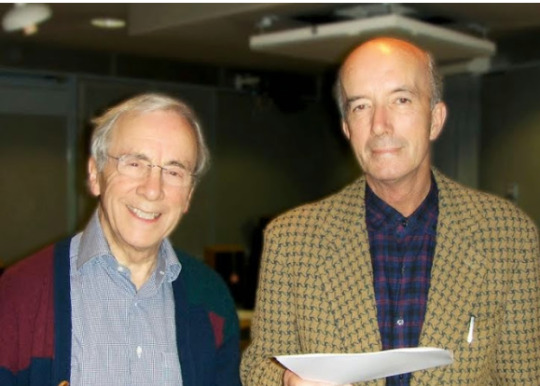
Andrew Sachs and Clive Merrison
The new Watson for “The Further Adventures is Andrew Sachs. Most well-know for playing Manuel in Fawlty Towers, he had an extensive career in radio drama and appeared previously on the show playing the King in “A Scandal in Bohemia”.
Hearing Merrison as Holmes with Sachs as Watson is admittedly a bit jarring at first after being so used to Williams’s portrayal. But I soon got used to him and the fine qualities of the performance became evident. This Watson is similar to Williams’s Watson in his intelligence, capabilities and compassion. The most evident change is that Sachs’s Watson is more soft-spoken. This changes the tone of the dialogue between Holmes and Watson, with Watson less often directly expressing anger and indicating his disagreements through subtle uses of wit and sarcasm. Yet the love and loyalty of the relationship between Holmes and Watson is still very much evident. The “old married couple who bicker but love each other” feel of their relationship is perhaps even stronger in their arguments now, with Watson almost literally going “yes, dear” in response to Holmes’s outlandish actions. It is an excellent performance.
The new stories written by Coules are based on references to untold stories in the canon. We get to learn about Colonel Warburton’s madness, the peculiar prosecution of John Vincent Harden, the Abergavenny murder, who “Merridew of abominable memory” was, and in the finale, “the whole story concerning the politician, the lighthouse, and the trained cormorant“.
The scripts are in general very good and present several enjoyable mysteries with strong characterizations. Some of my favourites are “The Singular Inheritance of Gloria Wilson”, “The Abergavenny Murder” and “The Remarkable performance of Frederick Merridew”. There are some lighter episodes, but the tone overall is noticeably dark, with Coules having the goal of exploring subjects that Conan Doyle wouldn’t because of the time he was writing in. We thus get episodes involving child murder and suicide.
The new episodes feel like a natural continuation of the early canon adaptations. The style is of course not a direct pastiche of the canon, but rather of the earlier BBC radio adaptations of the canon.
This form of auto-pastiche succeeds thanks to the production values being of the same high standard as before. Patrick Rayner, one of the main director-producers of the original series of canon adaptations continues his work here as the sole director-producer with similar great results. The sound effects and design are just as immersive in this series.
The acting is once again superb. Merrison continues his great performance as Holmes and Sachs is an excellent replacement for Michael Williams. The supporting cast is made-up of the same high quality actors as before, with famous names like Tom Baker and Toyah Wilcox having guest star roles.
“The Further Adventures” is overall a worthy continuation of the BBC’s adaptations of the Holmes canon. The high standards of the original series in writing, acting and direction are once again fulfilled and anyone who has enjoyed the canon adaptations and wanted more stories with Merrison as Holmes made by the BBC will probably be satisfied with “The Further Adventures”.
In particular, “The Marlbourne Point Mystery” is a worthy finale to the great undertaking that the BBC series starring Merrison has been. And the final scene, with Holmes and Watson reflecting on how Watson’s stories have made the two immortal is extremely moving.

I must also mention the book “221BBC” by Bert Coules, which is published by the Wessex Press and available from their website. This book is a personal account of the making of the BBC series, with information on every episode Coules was involved in. The book is well-written and the anecdotes and information in it is highly interesting for any fan of this radio series. The book can be a bit pricy if international shipping is factored in, but very much worth it.
Other resources worth mentioning are the semi-official site about the series. There are also some podcast interviews of people involved that are well worth hearing, like The I Hear of Sherlock everywhere podcast interviews with Bert Coules and Clive Merrison. Coules has also appeared on the Baker Street Babes podcast.
The radio series can fairly easily be found online, both legally and otherwise. And if my fan-girly ramblings haven’t made it totally clear, I fully recommend you to listen to it if you have any interest at all in Sherlock Holmes.
#radio holmes#bbc radio holmes#sherlock holmes#clive merrison#michael williams#bert coules#my writings
22 notes
·
View notes